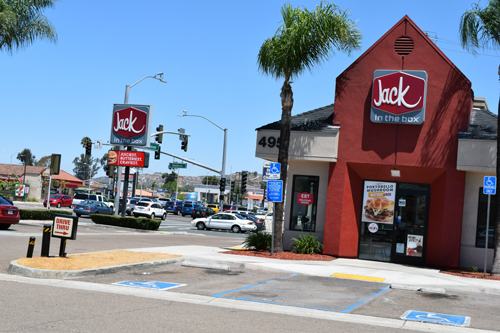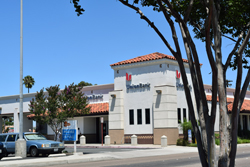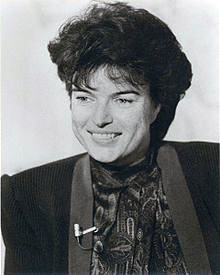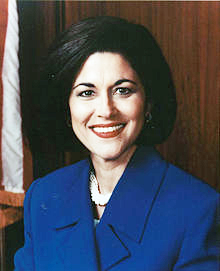
-52nd in a Series –
Exit 19, Second Street, El Cajon ~ Jack in the Box
By Donald H. Harrison

EL CAJON, California – There are numerous Jack in the Box restaurants, and nothing other than convenience made me pick the one at 495 N. Second Street over any of the others to tell the story of two partners—one Christian, one Jewish—who made a fortune selling Jack-in-the Box to Ralston-Purina and wound up both marrying ambitious politicians who, one after the other, became mayors of San Diego. This particular Jack in the Box outlet is right off Interstate 8 at the 2nd Street exit.
The Christian partner was Robert O. Peterson, a restaurateur who had founded a drive-in diner called Topsy’s in 1941, which he operated along with Oscar’s restaurants following his service as a naval intelligence officer in World War II. The Oscar’s located at 6270 El Cajon Boulevard in San Diego he converted in 1951 to a Jack in the Box, the first in the nation. Unlike the original McDonald’s Restaurant in Downey, California, the first Jack in the Box restaurant – complete with a rooftop clown on a spring popping out of a box — was torn down to make way for other commercial development.

The Jewish partner, Richard T. Silberman, was brought into the Jack in the Box restaurant chain to utilize his financing savvy to help grow the chain to 265 restaurants before the Ralston Purina sale, which was reported at $58 million. Millionaires and still relatively young men, Peterson and Silberman became involved in banking and in politics. They took over First National Bank, renaming it California First Bank and later selling it to the Bank of Tokyo, which renamed it again to Union Bank.
However, the pursuit of politics eventually drove them apart, according to lengthy and well-researched articles by the investigative reporter Matt Potter of the San Diego Reader.

Maureen O’Connor, San Diego’s first female mayor, was a Democrat. Susan Golding, the city’s second female mayor, was a Republican. Their ambitions to advance even higher than the mayor’s office spelled rivalry. Peterson married O’Connor in 1977, midway through her second term as a member of the City Council. Peteson and Silberman both helped O’Connor win election in 1986 as the 31st mayor of San Diego, a position in which she served eight years.
Meanwhile Golding served on the San Diego City Council and briefly as a deputy secretary in California’s business and transportation agency. Daughter of former San Diego State University president Brage Golding, Susan Golding used her maiden name after her divorce from attorney Stanley Prowse, and her children, Sam and Vanessa, also became known as Goldings.
All this while, Silberman was climbing the political ladder, appointed in 1977 by Gov. Jerry Brown as Secretary of Business and Transportation, and later, around the time when Brown was opposing President Jimmy Carter in the Democratic primaries of 1980, as the state director of finance.

Golding and Silberman began dating in 1982 while she was serving in Silberman’s former agency in the gubernatorial administration of Brown’s successor, Republican Gov. George Deukmejian. Silberman became Golding’s confidante and in 1984 her husband as well, in what wags referred to as the “great political alloyance.”
Although Silberman was a Democrat, he supported his Republican wife to the hilt, crushing the hopes of attorney Lynn Schenk of having his support in a race for a seat on the County Board of Supervisors. Schenk was a Brown loyalist who had been Silberman’s former deputy and protégé in the state Department of Business and Transportation. Some years later she would serve a single term in Congress, and later still would serve as chief of staff to Gov. Gray Davis, who himself had previously been a chief of staff to Jerry Brown.
Winning that election for county office in a bruising battle against Schenk, Golding went on to serve two terms as a member of the County Board of Supervisors, which oversees land use for the unincorporated areas of the county and is responsible for providing health and judicial services, among others services, throughout the entire county. On many issues, particularly in the realm of regional planning, the city and the county governments could cooperate or clash, and with both O’Connor and Golding eyeing higher office, the tension between the two former partners’ wives became palpable.
In the middle of her second term, as Golding was pondering running to succeed Mayor O’Connor, Silberman was indicted on a charge of money laundering. The FBI had been wiretapping the phone of Chris Petti, a San Diegan with reputed mob connections, and were amazed when they heard Silberman offer to launder some money for the mob. That led to Silberman’s phone also being tapped, and then to a sting operation, and, in 1989, Silberman was placed under arrest. At one point, he reportedly attempted to commit suicide prior to his trial, conviction, and sentencing to 46 months in a minimum security federal prison. Golding filed for divorce in 1991.
Issuing a contrite apology from prison via a son by a former marriage, Silberman said that “unfortunately I was not always truthful with her regarding critical and vital aspects of my life, and I know I am responsible for the changes in our relationship. We have been separated over a year now, and the obvious strains and difficulties have led us to mutually agree that it is time to end the marriage. I will always be grateful to her.”
In December 1992, over spirited opposition from Democrat Peter Navarro, Golding was elected as the city’s first Jewish mayor, the 32nd person to hold that office. Golding served two terms, for a total of eight years. A highlight of her term in office was having the 1996 Republican National Convention in San Diego – which erased the sting of the Republicans pulling their convention out of San Diego in 1972 in the midst of Richard Nixon’s ITT scandal. One of the 1996 presidential debates between incumbent Bill Clinton and challenger Bob Dole also was held in the city.
Many of Golding’s political allies believed that this chance to be in the national spotlight as the host mayor would position the mayor well to run for higher office – or to receive a highly visible Cabinet post in the event that Dole should win. But Clinton easily turned back Dole’s challenge, and a ticket guarantee deal with the San Diego Chargers in which the city agreed to make up the difference in revenue for any home football game not sold out was quite controversial, and cost Golding political support.
In 1998, Golding was an early entrant in the Republican contest for the U.S. Senate seat held by Democrat Barbara Boxer, but her campaign never caught on and she decided to drop out of the race.
Ironically neither Golding nor O’Connor advanced beyond the mayoralty, leaving former San Diego Mayor Pete Wilson, who became a U.S. Senator and later a governor of California, the only San Diegan in recent memory to win election outside what some have described as California’s political cul-de-sac.
In a sad footnote, O’Connor developed a bad gambling addiction, losing millions of dollars over the years, some of which she financed through a charitable trust left by Peterson. She told the court that a brain injury had influenced her errant behavior, and was put on probation, provided that she return the money to the trust. Eventually, the case against her was resolved without jail time.
Golding went on to become president and CEO of the Child Abuse Foundation in San Diego.
*
Harrison is editor of San Diego Jewish World. You may contact him at donald.harrison@sdjewishworld.com